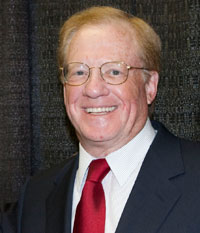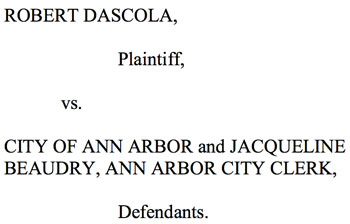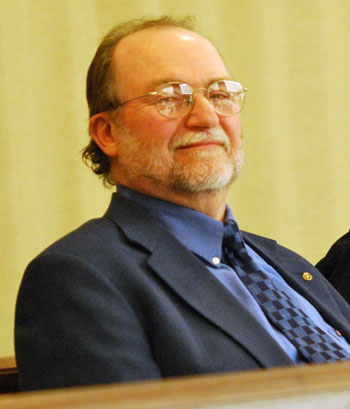The lineups for all the Ann Arbor city council primary races on Aug. 5, 2014 have now been finalized – except for Ward 3. Whether Bob Dascola’s name will appear alongside those of Julie Grand and Samuel McMullen will depend on the outcome of a lawsuit that has been filed in federal district court.

Tom Wieder. (Photo provided by Wieder. The margins of The Chronicle inline layout required cropping out the person next to whom Wieder is standing.)
The Chronicle has previously covered the various lawsuit filings in a fair amount of detail. The central issue in the case is whether Ann Arbor city charter requirements that were struck down as unconstitutional and declared null and void in 1972 can still be applied today.
While we’re waiting for a decision to be handed down, we thought it would be useful to get a possibly more accessible, spoken-word treatment of the lawsuit’s subject matter. To that end, we talked with Dascola’s attorney, Tom Wieder.
Wieder litigated a case similar to Dascola’s back in 2001.
Some highlights from the conversation include the fact that Wieder thinks the city council potentially has a role to play in the city’s handling of the case – based on the fact that the city attorney is accountable to the city council. The city’s legal stance should be determined by the council, Wieder says, not by the city attorney.
And Wieder talks about the fact that a council controlled by Democrats should allow the Democratic Party principle of free and open access to the ballot to guide their thinking on this matter – given that there are at least two plausible points of view on the enforceability of the city charter’s eligibility requirements.
The council’s particular responsibility as a group of Democrats leads to some discussion of the idea that Ann Arbor Democrats, who dominate city politics today, might be a different stripe from the Democrats of the early 1970s and 1980s, who fought for fewer eligibility requirements on candidates for city office.
It’s fair to point out that that Wieder was involved in two key changes to Ann Arbor’s electoral process that could reasonably be analyzed as leading to Ann Arbor’s current political life being dominated by Democrats: (1) redrawing ward boundaries in 1991; and (2) shifting elections from April to November.
Wieder also ventures that the Democratic dominance of local city politics might have lessened an historically strong Democratic interest in the value of process, and not just doing the right things, but doing things the right way: “… I think the fact that the Democrats have now been in charge pretty much for a while, there may be less self-examination when it comes to process and basic political principles than when somebody else was controlling those levers.”
Asked what he thinks the eligibility requirements for city council and mayor should be, Wieder suggests these requirements: At the time of filing petitions for office, a mayoral candidate should be a registered voter in the city; and at the time of filing petitions for office, candidates for city council should be registered voters in the wards they seek to represent.
One unsuccessful attempt to clean up the city charter – so that there are clear and constitutional eligibility requirements – was made in 2003. No matter how Dascola’s lawsuit turns out, Wieder thinks the city council needs to make a better effort to clean up the city charter – by establishing clear and constitutional eligibility requirements for mayor and city council. The council could propose different charter language on eligibility requirements for elective office and place a charter amendment before voters.
During the conversation, Wieder describes how the Wojack case led the city to print up two different sets of ballots, one with Wojack’s name and another set without it. If the Dascola case is resolved by early June, that contingency would not be necessary this time around.
The conversation with Wieder is presented in Q & A format below, with some re-ordering and editing. [Full Story]







